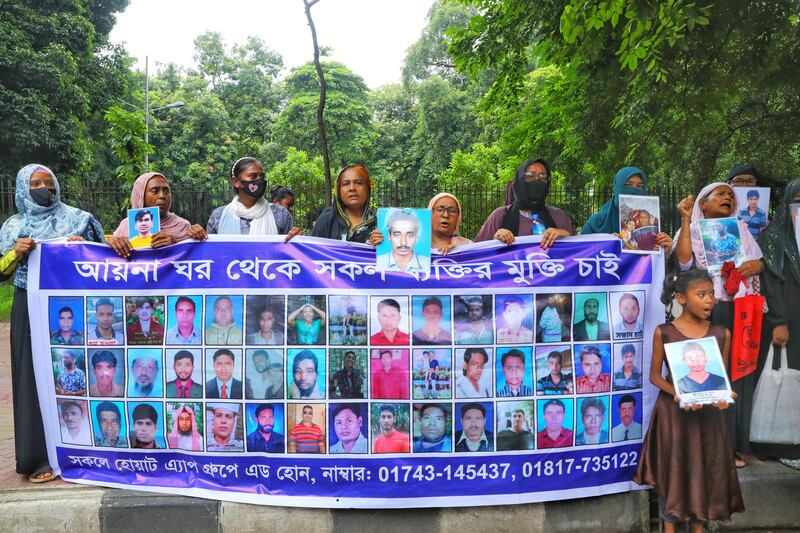The ex-intelligence chief of Bangladesh's Rapid Action Battalion (RAB) elite security force, during a court appearance Friday, denied accusations of being involved in extrajudicial killings and other atrocities committed during the rule of Sheikh Hasina, whose government fell last week.
Retired Army Maj. Gen. Ziaul Ahsan surrendered to Bangladesh troops, citing concerns for his safety, the Dhaka Metropolitan Police said in a statement. Police did not specify when Ahsan surrendered, but said the army handed him over early Friday.
“I am not involved in any murder and disappearance. I am innocent, I want justice,” local news reports quoted Ahsan as saying during a pre-trial detention hearing in Dhaka.
The court granted police eight days to detain Ahsan. RAB, a unit of the Bangladesh police that includes members of the military as well, was a notorious security force during the rule of Prime Minister Hasina, whose 15-year-old government was seen as repressive. It collapsed when she resigned and fled the country on Aug. 5 amid massive student protests.
Authorities were searching for Ahsan over his alleged involvement in the killing of Shahjahan Ali, who had died during a recent anti-Hasina government protest in the capital city. The victim’s mother filed a murder case against Ahsan on July 17.
Advocates and critics accused Ahsan, who also served as the former director general of Bangladesh's National Telecommunication Monitoring Center (NTMC) and was identified as a close associate of Hasina, of being involved in the extrajudicial killings and enforced disappearances under the former leader's reign.
Ahsan also told the court that authorities – whose identities he did not specify – took him away from his house and kept him for eight days, contradicting the police statement that he had turned himself in to the army.
“I was whisked away from my residence on Aug. 7,” he said. “I was put in ‘Ayna Ghar,’” referring to an alleged secret internment center of the country’s Directorate General of Forces Intelligence, the intelligence branch of the defense forces.

The United States had accused RAB of more than 600 enforced disappearances over 12 years, a similar number of extrajudicial killings, and the use of torture. Washington imposed sanctions on the group in December 2021 over its alleged human rights abuses.
Founded in 2004, RAB was charged with internal security, intelligence gathering related to criminal activities, and government-directed investigations, according to the U.S. Treasury.
Critics accused Hasina of politicizing state institutions and security forces, making them agents of her ambition to stay in power and crush dissent.
Ahsan also worked with the NTMC, a government agency under the Ministry of Home Affairs responsible for monitoring telecommunications within Bangladesh, allegedly to ensure public security. He served at the agency from 2017 until this month.
Critics accused the NTMC of eavesdropping on communications, blocking social media platforms, and shutting down internet services during protests against Hasina.
‘Not enough’
“[Ahsan] was the chief of the intelligence wing of RAB. Under his instruction and supervision, hundreds of people became the victims of extrajudicial killings and enforced disappearances,” human rights activist Sanjida Islam told BenarNews on Friday.
“[Ahsan’s] arrest is not enough. We have seen in the past that the perpetrators of heinous crimes were arrested but they evaded fair trial,” said Islam, a coordinator for Mayer Daak (Mothers’ Call), a group of relatives of victims of enforced disappearances during Hasina’s rule.

Cybersecurity analyst Tanvir Hasan Zoha also accused Ahsan of masterminding the Hasina administration’s deadly attacks against opposition leaders and activists along with suppression of press freedom and free expression in the country.
“The NTMC was created for [the] online vigilance of the people, organizations and entities posing national security threats. But under [Ahsan’s] leadership, the NTMC was used for wholesale and unlawful interception of conversations – both voice and messages – photos, videos, emails, and others of all people including intellectuals, writers, journalists, businessmen, opposition leaders, activists and others,” he told BenarNews on Friday.
Zoha, who had worked with NTMC and several government agencies, said RAB members abducted and detained him for 15 days in March 2016.
‘Unnecessary, disproportionate force’
Also on Friday, the United Nations said there were strong indications that Bangladesh security forces had used excessive force in quelling the deadly student-led protests against Hasina.
“There are strong indications, warranting further independent investigation, that the security forces used unnecessary and disproportionate force in their response to the situation,” the U.N. human rights office said in a preliminary report.
The U.N. said it would send a team to Bangladesh next week to investigate the alleged atrocities committed by the Hasina government.
